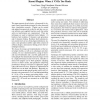Free Online Productivity Tools
i2Speak
i2Symbol
i2OCR
iTex2Img
iWeb2Print
iWeb2Shot
i2Type
iPdf2Split
iPdf2Merge
i2Bopomofo
i2Arabic
i2Style
i2Image
i2PDF
iLatex2Rtf
Sci2ools
105
click to vote
JVM
2004
2004
Kernel Plugins: When a VM Is Too Much
This paper presents kernel plugins, a framework for dynamic kernel specialization inspired by ideas borrowed from virtualization research. Plugins can be created and updated inexpensively on-the-fly and they can execute arbitrary user-supplied functions such that neither safety nor performance are compromised. Three key techniques are used to implement kernel plugins: (1) hardware fault isolation, (2) dynamic code generation, and (3) dynamic linking. Hardware fault isolation protects kernel-level services from plugin misbehavior, dynamic code generation enables rapid online creation of arbitrary plugins, and dynamic linking governs the kernel/plugin interface. We discuss the design and implementation of the kernel plugin facility, as well as its advantages and shortcomings. Its use is demonstrated by a range of microand macro-benchmarks and a real-life application featuring plugins that dynamically transcode images served by a high-performance kernel web server. Benefits realized from...
| Added | 31 Oct 2010 |
| Updated | 31 Oct 2010 |
| Type | Conference |
| Year | 2004 |
| Where | JVM |
| Authors | Ivan B. Ganev, Greg Eisenhauer, Karsten Schwan |
Comments (0)

